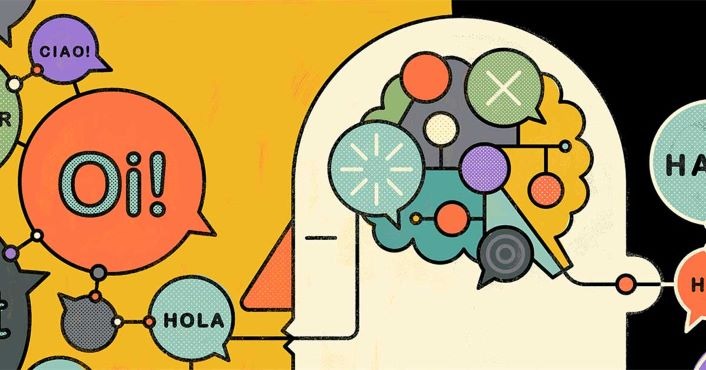Great interview on bilingualism, sports, education and neuroplasticity — en español

(translation available below)
PREGUNTA. ¿A qué se dedican los neuroconsultores? ¿Qué relación tienen con la educación?
RESPUESTA. En los últimos años ha empezado a aumentar el interés por mejorar la capacidad del cerebro. Al igual que las personas quieren estar en buena forma física, se preocupan también por estar en buena forma cognitiva. Se habla cada vez más de consultores del cerebro o entrenadores mentales y hay más actuaciones basadas en la neuroplasticidad. Esto se puede aplicar para ayudar a que los alumnos aprendan más. Por ejemplo, la escuela Arrowsmith de Canadá tiene un programa de refuerzo cognitivo para alumnos con necesidades especiales. También está creciendo mucho el mindfulness para reducir el estrés de niños y profesores.
P. Usted dice que la educación bilingüe es un gran aliado del desarrollo cerebral en los niños. ¿Qué muestra la evidencia científica?
R. El bilingüismo practicado de forma sostenida en el tiempo mejora las funciones ejecutivas del cerebro y ayuda a retrasar problemas cognitivos como el alzhéimer. No impide la patología, pero retrasa hasta cinco años la aparición de sus síntomas … El beneficio del bilingüismo viene de que obliga a hacer un esfuerzo cognitivo en tiempo real que ejercita la corteza prefrontal del cerebro. Las neuronas se conectan unas a otras y esas conexiones se fortalecen. Cuantas más neuronas y conexiones neuronales creemos, más reserva cognitiva tendremos para la edad de la jubilación y más tardará en afectarnos la enfermedad. Pero no se consigue sólo con el aprendizaje, sino con la práctica constante. En EEUU todo el mundo quiere aprender chino porque se dice que es el idioma del futuro, pero el problema es que luego no se practica. Tiene más sentido aprender español, porque existen más opciones reales de utilizarlo.
Cuatro horas semanales de ejercicio físico en horario escolar
Para potenciar la «salud cerebral» de los alumnos, recomienda que en los colegios españoles se haga más deporte. «Lo óptimo serían tres o cuatro horas a la semana de ejercicio aeróbico dentro del horario escolar [suele haber dos horas como mucho en Primaria]. El ejercicio físico fuerza a elevar el ritmo cardíaco y enviar más oxígeno al cerebro, lo que genera nuevas neuronas», dice. Y propone un programa en el que roten seis deportes distintos en un curso porque «la variedad, la novedad y el desafío son buenos para el cerebro»
___________________________________________
QUESTION. What do neuroconsultants do? What is their relationship to education?
ANSWER. In recent years, interest in improving brain capacity has begun to grow. Just as people want to be physically fit, they also care about being cognitively fit. There is more and more talk of brain consultants or mental trainers and there are more interventions based on neuroplasticity. This can be applied to help students learn more. For example, Arrowsmith School in Canada has a cognitive reinforcement program for students with special needs. Mindfulness is also growing a lot to reduce stress for children and teachers.
Q. You say that bilingual education is a great ally of brain development in children. What does the scientific evidence show?
A. Bilingualism practiced in a sustained way over time improves the executive functions of the brain and helps to delay cognitive problems such as Alzheimer’s. It does not prevent the pathology, but it delays the appearance of its symptoms by up to five years … The benefit of bilingualism comes from the fact that it forces to make a cognitive effort in real time that exercises the prefrontal cortex of the brain. Neurons connect to each other and those connections become stronger. The more neurons and neural connections we create, the more cognitive reserve we will have by retirement age and the longer it will take for the disease to affect us. But it is not achieved only with learning, but with constant practice. In the US everyone wants to learn Chinese because it is said to be the language of the future, but the problem is that it is not practiced later. It makes more sense to learn Spanish, because there are more real options to use it.
Four hours a week of physical exercise during school hours
To enhance the “brain health” of students, he recommends that Spanish schools offer more sport time. The optimum would be three or four hours a week of aerobic exercise during school hours [there are usually two hours at most in Primary]. Physical exercise forces you to raise your heart rate and sends more oxygen to the brain, generating new neurons,” he says. And he proposes a program rotating six different sports in a year because “variety, novelty and challenge are good for the brain”


